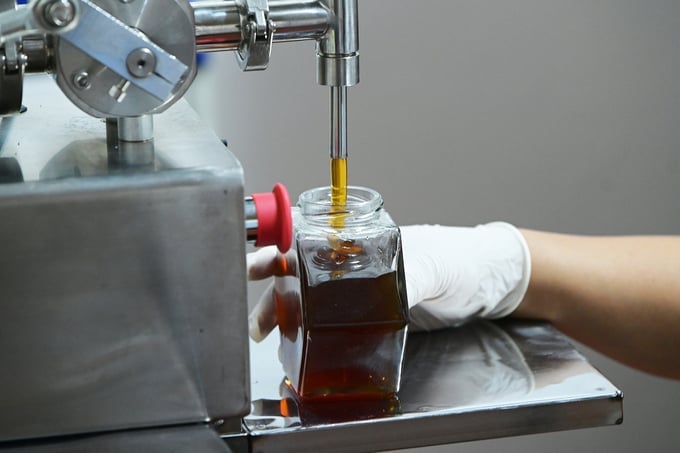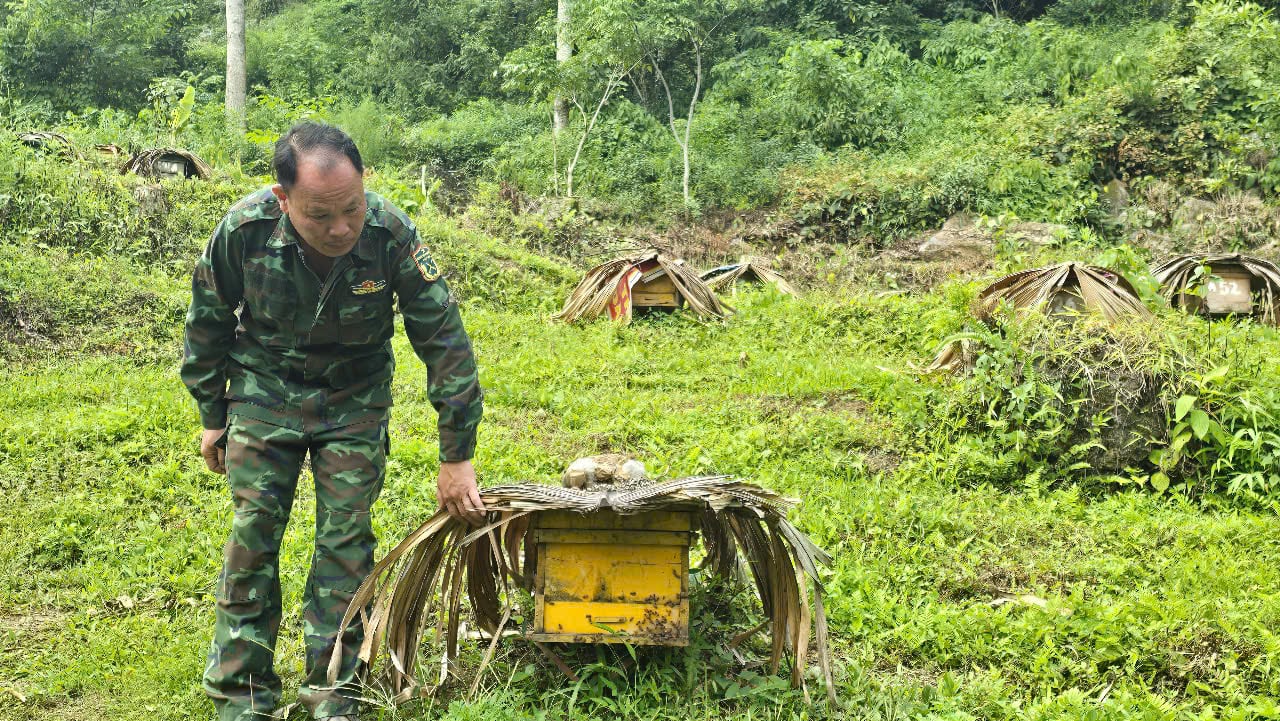November 8, 2025 | 17:47 GMT +7
November 8, 2025 | 17:47 GMT +7
Hotline: 0913.378.918
November 8, 2025 | 17:47 GMT +7
Hotline: 0913.378.918
The official implementation of Circular No. 09 by the Ministry of Agriculture and Environment will start on July 1, 2025. This new regulation provides a more precise definition of the delegation and decentralization of authority for state management in the disciplines of veterinary medicine and animal husbandry.

Processed honey is bottled for consumption and export and must meet veterinary hygiene and food safety regulations. Photo: Tung Dinh.
The circular underscores the importance of veterinary hygiene and food safety inspection and supervision in the context of beekeeping, honey collection, pre-processing, and processing for domestic and commercial export purposes. The expectation is that the regulation will result in a substantial change in the regulation of the quality of honey, a high-value agricultural export for Vietnam.
Controlling residues of veterinary drugs, chemicals, and harmful microorganisms will be the primary objective of inspections. Additionally, it will enhance traceability protocols to guarantee that the entire production chain, from beekeeping facilities to processing, adheres to food safety and sanitary regulations.
The Department of Livestock Production and Animal Health and the local Departments of Agriculture and Environment will conduct an annual monitoring program that will involve the regular collection of honey, bee feed, and veterinary medication residue samples. A ISO/IEC 17025-accredited laboratory will receive samples from beekeeping, collection, or processing facilities for analysis. Authorities have a duty to demand traceability, recall the product, and implement enhanced surveillance measures if a sample fails to satisfy the requirements.
The circular also defines the responsibilities of each stakeholder in the production chain. It is mandatory for beekeeping facilities to maintain comprehensive logbooks and administer veterinary drugs in accordance with regulations to guarantee a sufficient withdrawal period prior to honey harvesting. Honey collection and processing facilities are required to maintain quality records for a minimum of three years, establish a traceability system, and share food safety procedures with their supply chain partners.
An interesting new aspect of the circular is the reorganization of inspection authority. The Department of Livestock Production and Animal Health will be responsible for the supervision of export and mixed-use facilities, while the local Departments of Agriculture and Environment will oversee facilities that produce for domestic consumption. This delegation contributes to the improvement of field supervision, the increase of local initiative, and the reduction of pressure on central authorities.
The circular also contains stringent regulations regarding the use of veterinary pharmaceuticals in beekeeping. The use of pharmaceuticals that have been approved for circulation in Vietnam is restricted, and they must be prescribed by a veterinary professional. The use of feed in beekeeping must also adhere to the regulations for livestock feed. These provisions are essential for the prevention of food safety hazards at the source.

Exported honey will be strictly controlled in terms of veterinary hygiene and food safety along the chain, from beekeeping to processing, to meet international market requirements. Photo: Kien Trung.
This new circular is a critical legal foundation that assists Vietnam's beekeeping industry in moving to safe, sustainable production and in meeting the increasingly stringent standards of demanding markets such as the EU, the United States, and Japan, according to numerous experts. This is also a mandatory requirement for enhancing the added value of honey exports, a commodity with an annual turnover exceeding USD 100 million.
At present, Vietnam is one of the greatest honey exporters in Asia, with an average annual production of more than 50,000 tons. However, the industry has encountered numerous technical obstacles and residue warnings when attempting to enter high-end markets. The industry will be able to elevate quality standards and progress toward sustainable and responsible development as a result of the monitoring system's completion under the new circular.
Translated by Linh Linh

(VAN) Viet Nam is proactively adapting to climate change, improving its institutional framework, fostering innovation, and strengthening international cooperation to achieve net-zero by 2050.

(VAN) Vietnam promotes integrated management of seas and oceans, institutional improvement, innovation, and international integration, aiming to become a prosperous and sustainable maritime nation.

(VAN) Khanh Hoa Province is rapidly transitioning to high-tech marine aquaculture to adapt to climate change and enhance the value and output of its seafood.

(VAN) As the world marks the 80th anniversary of the United Nations, progress in ending hunger — the world's most solvable problem - is falling behind.
/2025/11/07/3118-0-nongnghiep-133114.jpg)
(VAN) The Prime Minister requested ministries, sectors, and localities to identify the development of science and technology, innovation, and digital transformation as a key and urgent political task.

(VAN) Innovation is emerging as a central driving force behind Viet Nam’s transformation toward a green, modern, and sustainable agricultural model.
/2025/11/06/3843-2-212949_172.jpg)
(VAN) Deputy Minister Phung Duc Tien suggested Thanh Hoa province strengthen the control of fishing vessels, strictly handle violations, and join nationwide efforts to lift the 'yellow card' imposed on Vietnamese seafood.